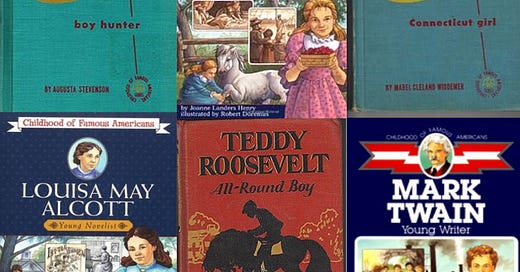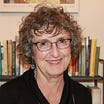As Noel and I started our first interviews, I began to reflect on my own experience of reading biography. Of all the books for elementary kids in the local public library, a series of blue biographies were the most inviting to me when I was about ten (Some of you might remember an orange edition of the same series). Only recently have I discovered that these biographies were a part of a widely popular series called the Childhood of Famous Americans, published between 1932 and 1958 by Bobbs-Merrill. To appeal to children, these books focused on the childhood of famous Americans, even if that meant adding fictional events and dialogue.
I remember reading the biographies of such women as Louisa May Alcott, Amelia Earhart, and Clara Barton. The one I remember best was about Elizabeth Blackwell (1821-1910), the first woman to receive a medical degree in the U.S. She encountered discrimination and barriers every step of the way. Professors made her sit separately from the men in classes. She was shunned in public as being a “bad” woman. Nevertheless, she graduated at the top of her class and practiced medicine. Together with her sister, who also became a doctor, she opened a clinic for women in NYC, and the two of them trained nurses for Union Hospitals during the Civil War. Later she founded a medical school in New York, put her sister in charge, and became a professor at the London School of Medicine for Women.
When I was growing up, girls were told that they could be secretaries, teachers, or nurses. Even as a teenager, I wanted eventually to study theology, but I didn’t know whether women could be ordained nor did I know that studying theology might be a good background for teaching or writing. By the time I became an English instructor at a technical community college I still had not met a woman who had been ordained, and it took a couple more years before I actually made the decision to go Candler School of Theology at Emory University where I was one of about twenty women in a student body of around four hundred. I believe that Elizabeth Blackwell was still speaking to me from that little blue biography that I checked out of the library when I was ten years old, and she wouldn’t shut up. “Don’t let them tell you that you can’t go into a so-called ‘male’ profession. Nonsense!” Such was the power of a biography.
As my collaboration with Noel began, I remembered two books that might have influenced my emerging idea for this autobiography. One was Janna Tull Steed's Duke Ellington: A Spiritual Biography. It was my introduction to a biography about a musician’s spiritual life. The second was A Song to Sing, A Life to Live: Reflections on Music as Spiritual Practice by my former professor at Candler School of Theology, Don Saliers, and his daughter, Emily Saliers of the Indigo Girls. While this book is mostly about music, it is partially autobiographical. As Don and Emily tell the stories of their lives in music, they point out the connections between Saturday night and Sunday morning music and explore the spiritual dimensions of each genre.
What can reading autobiographies do for a reader? That depends on whether they are written to distract or to empower. Many biographies and memoirs, especially if they are about celebrities, are written to distract by serving up chronicles of concert successes, sexual exploits, and encounters with real or imagined enemies. The empowering ones share stories of risks and discoveries, struggle and growth, failures and achievements, dreams abandoned and dreams fulfilled, the lost and the found. They don’t promise you a blueprint for your life or a formula for success. Elizabeth Blackwell’s story didn’t make me think I should be a doctor. What it did was invite me to ask the vocational questions that she had to ask about herself. What are my talents and interests? What her story gave me was imaginative possibility, vision, and encouragement.
Noel and I hope to inspire readers to seek a more just and loving world in which human beings recognize their connection to one another and to the natural world. We hope readers will find an alternative vision of a life well-lived in contrast to the individualistic, consumerist vision so prevalent in our society and in contrast to the zero-sum vision of winners and losers, quid pro quo, and self-made persons. Noel’s story offers not a template for success, but a model for human flourishing and the message that music can change hearts and minds and that imagination can show us alternatives to the dysfunction of a nihilistic age. JTF
Connections
In this essay I’ve tended to use “biography” as an inclusive term and haven’t explained the difference between memoir and autobiography, terms which are often used synonymously. Both are the stories of someone’s life written in the first person. That is, both use the pronouns “I” and “me.” Techically, an autobiography is a narrative of the author’s entire life up to the present. A memoir is a narrative that focuses on the author’s memories of a specific time frame or on specific themes that span the author’s entire life.
What biographies have empowered you? Or changed your mind? Or inspired you? How did they influence you? What were you seeking when you read them?
The Childhood of Famous Americans series is still available in an updated version, now published by Simon and Schuster. It includes biographies of such famous Americans as Ray Charles, Coretta Scott King, Arthur Ashe, Jacqueline Kennedy Onassis, and Mr. Rogers. If you are interested in an academic study of this beloved series, check out Gregory Pfitzer’s Fame Is Not Just for the Fellas.
Did you read biographies in this series when you were a kid? If so, what are your memories of them?







You ask about biographies that influenced my development. I will mention two. The first was a story written for young readers of Jane Addams, the founder of Hull House in Chicago, which I read as a ten year old. The second is a ninety page memoir “An Interview with Fr George Calciu: The Message of a Living Martyr.” I read this twenty years ago while I was learning about Eastern Orthodox spirituality.
Father Calciu was a devout Orthodox Christian priest in Romania who was emprisoned and tortured while the Communists were in power. He survived as so many did not. His parting words at the end of the interview read, “I am happy because I had this opportunity to tell you these things and to tell them to young people. They have to be prepared -- not for physical torture, not for hunger, or something like that but they have to preserve the moral integrity of their soul and their divine image within unchanged. They have to trust God and to trust themselves because Jesus is in their heart. ...”